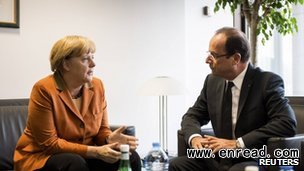EU leaders have agreed to set up a single eurozone banking1 supervisor2 - a major step towards a banking union.
欧盟领导人同意建立一个独立的欧元区银行监管机构,这是建立联合银行的一大步。

The deal was an uneasy compromise between Germany and France
A
legislative3 framework is to be in place by 1 January next year, with the body starting work later in 2013.
The European Central Bank-led
mechanism4 will have the power to
intervene in(干预,插手) any bank within the eurozone.
The deal appears to be a compromise between France and Germany, who earlier disagreed over the
timing5 and over the number of banks the ECB would
oversee6.
The timetable
remains7 important because only when the body is
fully8 operational will the eurozone's rescue fund inject cash directly into
ailing9 banks - so important for countries like Spain, says the BBC's Europe editor, Gavin Hewitt.
The deal was, at best, an uneasy compromise between the French and the Germans and much
wrangling10(争吵,争辩) lies ahead, our correspondent at the summit says.
France and the EU Commission wanted
joint12 banking
supervision13, with the ECB in the lead role, to become operational in January 2013.
But German
Chancellor14 Angela Merkel stressed that national budget discipline should be the priority.
Germany had been at
odds15 with the European Commission over the scope of the proposed ECB supervision. Under the draft plan, all 6,000 banks in the 17-nation eurozone would be included - Germany wanted it limited to the biggest, "systemic" banks.
Previously16, the German government has expressed a desire to retain supervisory responsibility within Germany over the country's Landesbanks - state-owned banks that play a key role in the economies and state finances of Germany's federal regions.
Announcing the result of talks early on Wednesday, European Council President Herman van Rompuy said the 27 EU member states had agreed to set up - by the end of this year - "a Single Supervisory Mechanism [SSM], to prevent banking risks and cross-border
contagion17(传染病,蔓延) from emerging".
"Once this is agreed, the SSM could probably be effectively operational in the course of 2013," he said.
EU Commission President Jose Manuel Barroso said that the ECB "will be able to intervene if needed in any bank in the euro area".
Both Germany and France appeared to be claiming victory in the
negotiations18.
The German chancellor said that the agreement was that "banks must be supervised in a differentiated way. That means that some will be direct... at the ECB level and others
indirectly19, via the national authorities."

 收听单词发音
收听单词发音 


